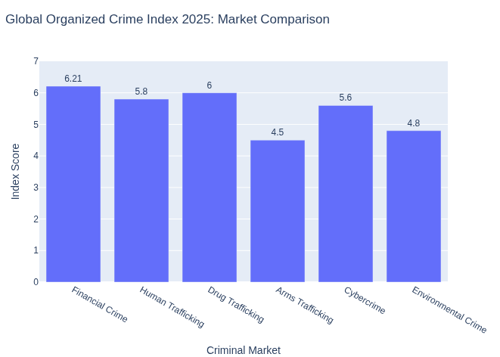
Global Organised Crime Index 2025: The fight against financial crime is not going well.
14/11/2025
According to the Global Organised Crime Index, the fight against financial crime is not going well in 2025.
Here's the summary:
- "In terms of global pervasiveness, financial crimes remain the most prevalent criminal market in 2025, with a score of 6.21.
- Of the 15 markets measured by the Index, this market also saw the most significant expansion since 2023 (+0.24, up from 5.98) and is the only market indicator consistently ranked among the top five in all continents (taking the top spot in both Africa and Europe).
- This extensive global scope reflects not only the broad spectrum of crimes encompassed within the financial crimes category – from traditional offences, such as embezzlement and tax evasion, to sophisticated cyber-enabled schemes like online scams and business email compromise – but also its growing appeal, as it is generally perceived as a low-risk, low-cost form of crime.
- Notably, 78 countries recorded worsening financial crime markets since 2023.
Visualising the Trend
Financial crime is now the most pervasive criminal market globally, scoring 6.21 in the 2025 Index—higher than drug trafficking and cybercrime.
Here’s how it compares:

Key Observations:
- Financial crime leads all markets.
- Drug trafficking remains high but slightly below financial crime.
- Cybercrime is close behind, reflecting digital convergence.
- Arms and environmental crimes rank significantly lower.
Main Drivers Behind Financial Crime Growth
Recent reports highlight several converging factors fuelling this surge:
- Digital Transformation & Cyber Enablement
- Criminals exploit AI, virtual assets, and decentralised finance (DeFi) for laundering and fraud.
- Business Email Compromise (BEC) and online scams are increasingly sophisticated. [CodeInterpreter | InteractiveChart]
- Economic Pressures
- Inflation, job insecurity, and trade disruptions push consumers toward counterfeit goods and illicit financial channels. [secretariat-intl.com]
- Low-Risk Perception
- Financial crime is seen as low-cost, low-risk, especially compared to violent crimes.
- Weak enforcement and fragmented cross-border cooperation exacerbate this perception. [financialcrime.lu]
- Globalisation & Mobility of Criminal Networks
- Foreign actors and transnational cooperation among criminal groups have sharply increased since 2023. [secretariat-intl.com]
Regulatory Responses in 2025
Regulators are stepping up, but challenges remain:
- FATF Guidance Updates
- Enhanced National Risk Assessments and beneficial ownership transparency to close anonymity gaps. [globalinitiative.net]
- AI & Compliance Oversight
- EU AI Act and similar frameworks demand model risk management and human oversight in compliance systems. [flagright.com]
- Crypto & Stablecoin Regulation
- Proposed U.S. GENIUS Act introduces a federal framework for stablecoins, tightening AML standards. [flagright.com]
- Sanctions & Enforcement
- Expanded sanctions regimes targeting illicit financial flows linked to geopolitical actors. [finscan.com]
- Public-Private Collaboration
- Regulators emphasise cross-border partnerships and technology-driven compliance frameworks to tackle emerging threats. [stout.com]
Implications for Compliance Professionals
- Invest in AI-driven monitoring and real-time analytics for fraud detection.
- Strengthen beneficial ownership checks and adapt to new transparency rules.
- Prepare for crypto-focused AML frameworks and evolving sanctions regimes.
- Foster collaborative intelligence sharing across jurisdictions.
Source
The Team
Meet the team of industry experts behind Comsure
Find out moreLatest News
Keep up to date with the very latest news from Comsure
Find out moreGallery
View our latest imagery from our news and work
Find out moreContact
Think we can help you and your business? Chat to us today
Get In TouchNews Disclaimer
As well as owning and publishing Comsure's copyrighted works, Comsure wishes to use the copyright-protected works of others. To do so, Comsure is applying for exemptions in the UK copyright law. There are certain very specific situations where Comsure is permitted to do so without seeking permission from the owner. These exemptions are in the copyright sections of the Copyright, Designs and Patents Act 1988 (as amended)[www.gov.UK/government/publications/copyright-acts-and-related-laws]. Many situations allow for Comsure to apply for exemptions. These include 1] Non-commercial research and private study, 2] Criticism, review and reporting of current events, 3] the copying of works in any medium as long as the use is to illustrate a point. 4] no posting is for commercial purposes [payment]. (for a full list of exemptions, please read here www.gov.uk/guidance/exceptions-to-copyright]. Concerning the exceptions, Comsure will acknowledge the work of the source author by providing a link to the source material. Comsure claims no ownership of non-Comsure content. The non-Comsure articles posted on the Comsure website are deemed important, relevant, and newsworthy to a Comsure audience (e.g. regulated financial services and professional firms [DNFSBs]). Comsure does not wish to take any credit for the publication, and the publication can be read in full in its original form if you click the articles link that always accompanies the news item. Also, Comsure does not seek any payment for highlighting these important articles. If you want any article removed, Comsure will automatically do so on a reasonable request if you email info@comsuregroup.com.


